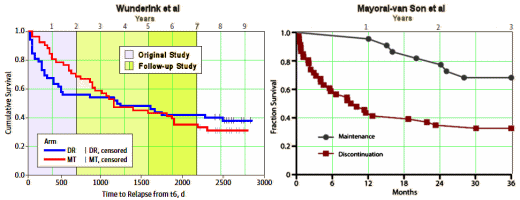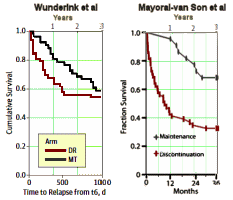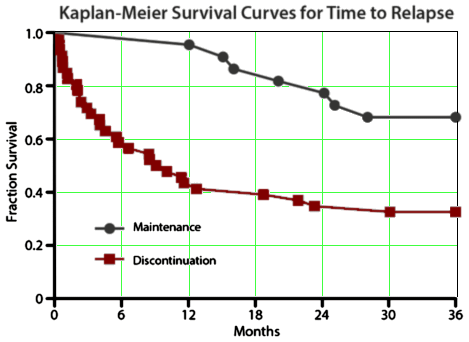Clinical Outcome After Antipsychotic Treatment Discontinuation in Functionally Recovered First-Episode Nonaffective Psychosis Individuals: A 3-Year Naturalistic Follow-Up Studyby Jacqueline Mayoral-van Son, MD; Victor Ortiz-Garcia de la Foz, VTE; Obdulia Martinez-Garcia, PhD; Teresa Moreno, MD; Maria Parrilla-Escobar, MD; Elsa M. Valdizan, MD, PhDc; and Benedicto Crespo-Facorro, MD, PhDJournal of Clinical Psychiatry. Published online 12/08/2015
Objective: The timing of antipsychotic discontinuation in patients who have fully recovered from their initial episode of psychosis is still open to discussion. We aimed to evaluate the risk of symptom recurrence during the 3 years after antipsychotic discontinuation in a sample of functionally recovered first-episode nonaffective psychosis [FEP] patients [DSM-IV criteria] with schizophrenia spectrum disorder.Method: Participants in this open-label, nonrandomized, prospective study were drawn from an ongoing longitudinal intervention program of FEP from a university hospital setting in Spain. From July 2004 to February 2011, functionally recovered FEP individuals were eligible if they met the inclusion criteria of [1] a minimum of 18 months on antipsychotic treatment, [2] clinical remission for at least 12 months, [3] functional recovery for at least 6 months, and [4] stabilization at the lowest effective doses for at least 3 months. Forty-six individuals who were willing to discontinue medication were included in the discontinuation group [target group]. Twenty-two individuals opted to stay on the prescribed antipsychotic medication and therefore were included in the maintenance group [control group]. Primary outcome measures were relapse rate at 18 and 36 months and time to relapse.Results: The rates of relapse over the 3-year period were 67.4% [31 of 46] in the discontinuation group and 31.8% [7 of 22] in the maintenance group. The mean time to relapse was 209 [median = 122] days and 608 [median = 607] days, respectively [log rank = 10.106, P = .001]. The resumption of antipsychotic medication after the relapse occurred was associated with clinical stability and lack of further relapses. When the overall group of relapsed individuals from the 2 conditions [N = 38] was compared to those who remained asymptomatic after 3 years [N = 30], there were significant differences [P < .05] in total scores on the Scale for the Assessment of Negative Symptoms, the Clinical Global Impressions scale, and the Disability Assessment Schedule.Conclusions: Antipsychotic treatment discontinuation in individuals who had accomplished a functional recovery after a single psychotic episode was associated with a high risk of symptom recurrence. Relapsed individuals had a greater severity of symptoms and lower functional status after 3 years.
Trial Registration: ClinicalTrials.gov identifier: NCT02220504Author contributors: Drs Mayoral-van Son, Parrilla-Escobar, and Moreno collected clinical data. Dr Mayoral-van Son interpreted the results and drafted the manuscript. Mr Ortiz-Garcia de la Foz performed the statistical analyses and drafted the manuscript. Dr Crespo-Facorro interpreted the results and reviewed the manuscript. Drs Valdizan and Martinez-Garcia helped in the interpretation of clinical data and reviewed the manuscript. The corresponding author had access to all study data. All authors approved the final version of the manuscript.Potential conflicts of interest: Dr Crespo-Facorro has received honoraria for his participation as a speaker at educational events from Otsuka, Lundbeck, and Johnson & Johnson. Drs Mayoral-van Son, Valdizan, Parrilla, Moreno, and Martinez-Garcia and Mr Ortiz-Garcia de la Foz report no additional financial or other relationship relevant to the subject of this article.Funding/support: The present study was conducted at the Hospital Marqués de Valdecilla, University of Cantabria, Santander, Spain, under the following grant support: SENY Fundación Research Grant CI 2005-0308007 and Fundación Marqués de Valdecilla API07/011.

 … and then again in a scaled-and-colored-to-match version to show the difference in parallel. For review, Wunderink et al’s initial report after two years found what has traditionally been reported – that maintenance medication had a significant positive effect on relapse rates. However, in a later follow-up, they found that the relapse rates equalized [from about three years on], and on functional testing, the patients who were not on a fixed maintenance schedule actually came out better by a respectable margin at about seven years. This new study from Spain did not replicate Wunderink’s findings:
… and then again in a scaled-and-colored-to-match version to show the difference in parallel. For review, Wunderink et al’s initial report after two years found what has traditionally been reported – that maintenance medication had a significant positive effect on relapse rates. However, in a later follow-up, they found that the relapse rates equalized [from about three years on], and on functional testing, the patients who were not on a fixed maintenance schedule actually came out better by a respectable margin at about seven years. This new study from Spain did not replicate Wunderink’s findings:A systematic review of studies exploring the recurrence of psychotic symptoms with antipsychotic discontinuation in first-episode nonaffective psychosis reported a weighted mean recurrence rate of 77% during the first year and more than 90% at 2 years.33 In contrast, the 1-year risk of recurrence within the medication continuation group was estimated at 3%. These estimates differed considerably from the 1-year rates of relapse in FEP patients of 61% in the discontinuation group and 26% in the continuation medication group reported by Leucht and colleagues.1 Methodological discrepancies in the study design; inclusion criteria; and duration of follow-up, diagnosis, and hospitalization rates make comparability between studies problematic. Wunderink and colleagues, exploring remitted psychotic patients, observed that relapse rates were 2 times higher in individuals who gradually tapered or discontinued medication, and that only 20% of patients could be successfully discontinued. Strikingly, those patients with an earlier reduction or discontinuation treatment strategy appear to have long-term functional gains compared with individuals who maintained treatment. Stopping antipsychotic medication has been repeatedly demonstrated as the biggest predictor of relapse in schizophrenia. It is of note that, despite most relapsed patients’ responding promptly to resuming antipsychotics, our data herein indicate that patients who suffered a relapse had a decreased functional status and a greater severity of symptomatology at 3 years compared with those patients who did not relapse.
But the general tone of the discussions about maintenance medications in psychotic illness has been so contentious for so long that it would be naive to think that any one study will bring things to any resolution. The dialog has been too divisive to expect anything to be that simple. The issues of maintenance antipsychotics, involuntary hospitalization, forced drugging, commercialization, conflicts of interest, the medical model, guild vs guild, the recovery and survivor movements, etc. have gotten all glommed up together and made productive dialog difficult at best and, at times, impossible [see persistence…]. But the resolution between the implications of those two graphs, these two studies, isn’t a polemic difference – it’s science, a science that needs to be worked out scientifically.
As I’ve said before, I started out believing that aiming to be medication-free was the best of ideas following a psychotic episode, but my experience was different. I had believed that working together, the patient and I could identify triggers and incipient symptoms, and prevent or outrun relapses. But that was the exception rather than the rule in my [again] limited experience. In this study, they found what I saw – that the onset of relapse occurred with little or no prodrome, and the relapse itself was more than just disruptive – it was destructive. My perspective is [again] anecdotal, but theirs comes from a more scientific observational frame.

There’s discontinuation and then there’s discontinuation. How were the drugs tapered? Did the study contain protocols for identifying withdrawal syndrome?
Even minimizing drug dosage carries benefits, in reducing risk of the well-known serious side effects of antipsychotics. Getting down to the minimum effective dosage also requires a gradual, well-managed taper.
Even if maintenance medication is proved beyond a doubt to be beneficial, tailoring the dosage to the individual has got to be the next step.
I imagine that premorbid characteristics of the individuals who develop schizophrenia probably determine outcome in terms of who can (and cannot) discontinue medications and do better in terms of relapse and functional outcomes. Future research needs to focus on delineating what premorbid capacities (IQ, education, personality traits, interpersonal relatedness, family support, social integration, medical conditions, health maintenance to name a few) influence the dependent variables of interest (recovery, functional capability and capacity). Marty Harrow’s work is instructive in this regard.
What struck me about the graph was that there was a huge drop in functional recovery among those who discontinued between 0 and 12 months, but that between 12 and 36 months both groups declined, and the rate if decline was slightly greater among the medicated group -who had farther to fall.
It’s hard for these studies to sort out the nuance of what is seen clinically. The more insight the pt has about their sx, especially the positive sx, the less dosing they seem to need. Psychoeducation plays such a huge role in schizophrenia as evidenced by the major effects of family therapy (and my clinical experience). A lot seems to depend on how they view their sx, as outside forces working against them or as a “sort of mix up your sensory system” (something I say often). Mizrahi et al is a good paper in this discussion bc it shows that pts originally thought the meds were going to eradicate voices but then they realize they just made them easier to ignore. Having some voices and odd perceptions is a whole lot less of a big deal when my patient has clear insight into their schizophrenia, they just kinda shrug it off and go about their business. The ones who don’t have insight are haunted by their sx whereas the ones who do develop compensatory mechanisms (ie staying on task with something) that keeps them from paying more attention than they need to. They also are a whole lot less likely to incorporate their experience into some delusional construct either bc they know it feels like it’s coming from outside but it’s really through them. So, at the end of the day I’m a firm believer that insight is the most important factor determining the amount of dosing that’s required for chronic paranoid schizophrenic patients. Disorganized and catatonic are generally a much different treatment altogether as they tend to be far sicker so my comments above aren’t really meant to apply to them.
http://www.sciencedirect.com/science/article/pii/S0278584605000965